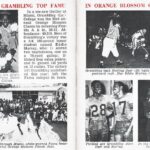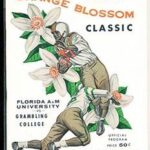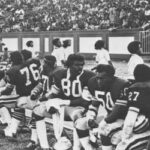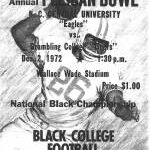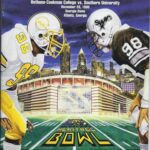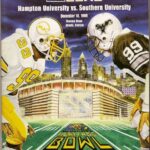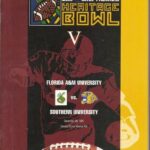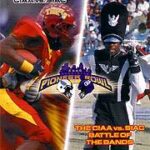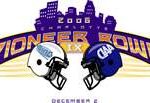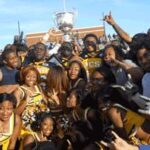The Orange Bottom Classic was started in 1933 at the Florida Agricultural & Mechanical College (FAMC) at a time when Blacks were not allowed to compete in bowl games. The college business manager (and son of the college president) J.R.E. Lee, Jr., along with an athletic committee appointed by the President, had an innovative concept and idea of bringing an outstanding football team from another part of the country to play against the Florida A&M football team at the end of the regular season.
The first game was played at Durkee Field, a “Blacks-only” ballpark, in Jacksonville, Florida, on December 2, 1933. The fans who attended saw Florida A&C defeat Howard University of Washington, DC by a score of 9-6. For 13 years, the contest hopped around the Florida cities of Orlando, Jacksonville and Tampa before becoming an annual event in Miami in 1947. After the classic moved to Miami, attendance grew very quickly. Miami became a mecca for alumni, fans and friends of Historically Black Colleges & Universities (HBCU’s). Each year thousands flocked to south Florida to reunite with old friends, and to witness and participate in one of the most colorful football games in the South.
The game proved to be the forerunner of season ending spectacles, such as the Bayou Classic in Louisiana and the Florida Classic in Orlando. From 1933 -1978, this was the must see game of the post season. Hosted by Florida A&M, for many years, it quickly became the “premier” HBCU Football Classic and was considered the unofficial de facto Black college championship game, the game that would determine the Black College National Champion!
1933 Florida A&M 9, Howard 0
1934 Florida A&M 13, Virginia State 12
1935 Kentucky State 19, Florida A&M 10
1936 Prairie View 25, Florida A&M 0
1937 Florida A&M 25, Hampton 20
1938 Florida A&M 9, Kentucky State 7
1939 Florida A&M 42, Wiley 0
1940 Central State 0, Florida A&M 0
1941 Florida A&M 15, Tuskegee 7
1942 Florida A&M 12, Texas College 6
1943 Hampton 39, Florida A&M 0
1944 Virginia State 19, Florida A&M 6
1945 Wiley 32, Florida A&M 6
1946 Lincoln 20, Florida A&M 0
1947* Florida A&M 7, Hampton 0
1948 Virginia Union 10, Florida A&M 6
1949 North Carolina A&T 20, Florida A&M 14
1950 Central State, OH 13, Florida A&M 6
1951 Florida A&M 67, NC Central 6
1952 Florida A&M 29, Virginia State 7
1953 Prairie View 33, Florida A&M 27
1954 Florida A&M 67, Maryland State 19
1955 Grambling 28, Florida A&M 21
1956 Tennessee State 41, Florida A&M 39
1957 Florida A&M 27, Maryland State 21
1958 Prairie View 26, Florida A&M 8
1959 Florida A&M 28, Prairie View 7
1960 Florida A&M 40, Langston 26
1961 Florida A&M 14, Jackson State 8
1962 Jackson State 22, Florida A&M 6
1963 Morgan State 30, Florida A&M 7
1964 Florida A&M 42, Grambling 15
1965 Morgan State 36, Florida A&M 7
1966 Florida A&M 43, Alabama A&M 26
1967 Grambling 28, Florida A&M 25
1968 Alcorn State 36, Florida A&M 9
1969 Florida A&M 23, Grambling 19
1970 Jacksonville State 21, Florida A&M 7
1971 Florida A&M 27, Kentucky State 9
1972 Florida A&M 41, Md-Eastern Shore 21
1973 Florida A&M 23, South Carolina State 12
1974 Florida A&M 17, Howard 13
1975 Florida A&M 40, Kentucky State 13
1976 Florida A&M 26, Central State, OH 21
1977 Florida A&M 37, Delaware State 15
The Pelican Bowl (1972 – 1975) was a postseason collegiate football game which pitted the champions of the Mid-Eastern Athletic Conference (MEAC) against the champions of the Southwestern Athletic Conference (SWAC) in a match up organized to be an informal Black College National Championship game.
The Pelican Bowl was played three times in total and twice in New Orleans, once at Tulane Stadium and once at the Superdome. In the beginning, the Pelican Bowl was planned to be held at Ace W. Mumford Stadium on the campus of Southern University in Baton Rouge, Louisiana. However, the inaugural game in 1972 was forced to move to Durham, North Carolina after a riot on Southern’s campus earlier that year. The Grambling State Tigers represented the SWAC against North Carolina Central University (NCCU), which was the MEAC’s champion. Over 20,000 fans witnessed a complete blowout as Grambling dominated NCCU 56-6 to claim the Black College National Championship.
In the three-year existence of the Pelican Bowl, the game featured some of the biggest names in HBCU football. Grambling’s Eddie Robinson and South Carolina State’s Willie Jefferies both coached in two games while Grambling’s Doug Williams and South Carolina State’s Harry Carson played in the game. In 1974, Grambling’s end of the season bowl victory was no. 236 for legendary head coach Eddie Robinson. In the 1975 game, Southern defeated SC State in the final showdown of HBCU heavyweights.
The creators of the Pelican Bowl had hopes that the event would become a holiday-season college football tradition but a number of factors, like poor attendance, a failure to secure a television broadcast deal, and general apathy led to its brief existence.
1972 Grambling 56, North Carolina Central 6
1973 Cancelled
1974 Grambling 28, SC State 7
1975 Southern 15, SC State 12
From the vision of MEAC Commissioner Ken Free and SWAC Commisioner James Frank, The Heritage Bowl was born in January of 1991, when delegates to the NCAA Convention approved a postseason bowl game between the SWAC and MEAC, the country’s leading I-AA conferences for historically black colleges and universities
Even though it was touted as the Black College National championship game, through the years there were conference misalignments which resulted in the conference champions declining the automatic bowl bid in order to participate in the NCAA Division I-AA playoffs. This was an especially common issue for the MEAC, often leaving its runner-up—or even its third seed, for the final two Heritage Bowls—to represent the conference. Because of the MEAC’s unwillingness to guarantee that its champion would participate, the television contract was ended ( the game was televised on ESPN ) and eventually the game was too, even though attendance surpassed some higher division bowl games. Perhaps not coincidentally, the SWAC, which usually did send its conference champion, won most of the Heritage Bowls that were held. The game after the 1994 season, Grambling St vs South Carolina St., was the only one to feature both conferences’ top seeds.
The first game in December of 1991 at Joe Robbie Stadium in Miami saw Alabama State of the SWAC beat North Carolina A&T, 36-13. The game for the 1992 season was actually held on January 2, 1993 after the organizers moved Heritage Bowl II to Tallahassee, Fla. iwhere Grambling beat host Florida A&M, 45-15, moving the SWAC to 2-0 in the series.
Following the 1993 football season, Heritage Bowl III was the first to be held in the Georgia Dome in Atlanta, this time on New Years Day 1994, and it marked the first of Southern University’s six appearances in the Heritage Bowl. The Jaguars moved the SWAC to 3-0 with its 11-0 victory over South Carolina State. A year later in 1994, S.C. State exacted a measure of revenge for the MEAC with its 31-17 victory over Grambling. This was the only year in which both conference’s champion appeared in the Heritage Bowl.
Southern won its second Heritage Bowl and moved the SWAC to 4-1 with a 30-25 victory over Florida A&M in Heritage Bowl V in December of 1995. In 1996, Howard University gave the MEAC its second victory in the Heritage Bowl series. The Bisons scored late in the game to beat Southern, 27-24, in what is considered to have been one of the best of the nine games.
In 1997, Southern defeated South Carolina State 34 – 28 in another of the better games in the bowl series in Heritage Bowl VII. Southern made it’s fourth consecutive Heritage Bowl appearance in 1998, defeating bowl newcomer Bethune-Cookman 28 – 2 in Heritage Bowl VIII. Heritage Bowl IX was held in December of 1999, and featured a rematch of Hampton and Southern, which made it’s fifth straight appearance. Hampton enacted a measure of revenge against Southern, whom they lost to earlier in the season, by beating the Jaguars 24-3 in what was the last in the Heritage Bowl series!
Heritage Bowl I December 21, 1991 Alabama State 36, NC A&T 13
Heritage Bowl II January 2, 1993 Grambling 45, Florida A&M 15
Heritage Bowl III January 1, 1994 Southern 11, So Carolina State 0
Heritage Bowl IV December 30, 1994 So Carolina St 31, Grambling 27
Heritage Bowl V December 29, 1995 Southern 30, Florida A&M 25
Heritage Bowl VI December 31, 1996 Howard 27, Southern 24
Heritage Biwl VII December 27, 1997 Southern 34, So Carolina State 28
Heritage Bowl VIII December 26, 1998 Southern 28, Bethune–Cookman 2
Heritage Bowl IX December 18, 1999 Hampton 24, Southern 3
Begun in 1997 as the brainchild of then Southern Intercollegiate Athletic Conference commissioner Wallace Jackson, The Pioneer Bowl (1997 – 2001, 2003 – 2007, 2009 – 2012) was a NCAA sanctioned bowl game between football teams from the Central Intercollegiate Athletic Association (CIAA) and the Southern Intercollegiate Athletic Conference (SIAC), two NCAA Division II athletic conferences. The Pioneer Bowl was one of three sanctioned bowl games on the Division II level. The winner of The Pioneer Bowl in most years was also selected as Divison II Black College National Champions by organizations honoring such an award.
Tuskegee University made the most appearances at the Pioneer Bowl, with a total of 10. Tuskegee has also won the most Pioneer Bowls, with seven wins. Until 2012, Tuskegee’s regular season extended longer than most other Division II teams (its last regular season game was the Turkey Day Classic on Thanksgiving Day), which prevented the team from playing in the NCAA’s Division II, now FCS, playoff tournament; the Pioneer Bowl was thus the only way Tuskegee could play in the postseason.
1997 Pioneer Bowl I @ Herndon Stadium – Atlanta, GA
Kentucky State University – 30
Livingstone College – 26
1998 Pioneer Bowl II @ Herndon Stadium – Atlanta, GA
Tuskegee University – 23
Livingstone College – 9
1999 Pioneer Bowl III @ GA Dome – Atlanta, GA
Winston Salem State University – 23
Tuskegee University – 7
2000 Pioneer Bowl IV @ GA Dome – Atlanta, GA
Tuskegee University – 12
Winston Salem State University – 9
2001 Pioneer Bowl V @ GA Dome – Atlanta, GA
Tuskegee University – 28
Virginia Union University – 0
2003 Pioneer Bowl VI @ GA Dome – Atlanta, GA
Albany State University – 52
Fayetteville State University – 30
2004 Pioneer Bowl VII @ Ladd-Peebles Stadium – Mobile, AL
Shaw University – 30
Tuskegee University – 28
2005 Pioneer Bowl VIII @ American Legion Memorial Stadium – Charlotte, NC
Tuskegee University – 28
Bowie State University – 26
2006 Pioneer Bowl IX @ American Legion Memorial Stadium – Charlotte, NC
Tuskegee University – 17
Johnson C. Smith University – 7
2007 Pioneer Bowl X @ Charlie W. Johnson Football Stadium – Columbia, SC
Tuskegee University – 58
Virginia Union University – 51
2009 Pioneer Bowl XI @ Charlie W. Johnson Football Stadium – Columbia, SC
Tuskegee University – 21
Elizabeth City State University – 7
2010 Pioneer Bowl XII @ A.J. McClung Memorial Stadium – Columbus, GA
Saint Augustine’s College – 20
Fort Valley State University – 9
2011 Pioneer Bowl XIII @ A.J. McClung Memorial Stadium – Columbus, GA
Johnson C. Smith University – 35
Miles College – 33
2012 Pioneer Bowl XIV @ A.J. McClung Memorial Stadium – Columbus, GA
Elizabeth City State University – 28
Tuskegee University – 13
Started in 2015, The Air Force Reserve Celebration Bowl features the match-up of champions from the Mid-Eastern Athletic Conference (MEAC) and the Southwestern Athletic Conference (SWAC), the two prominent HBCU NCAA Division I athletic conferences.
On March 18, 2015, ESPN Events officially announced the upcoming bowl game at the College Football Hall of Fame in Atlanta. The game is owned, operated and broadcast by ESPN, who also owns and operates the MEAC/SWAC Challenge, the annual interconference game between the two conferences, held during Labor Day weekend football in Orlando, Florida. The Celebration Bowl has a $2 million dollar payout, $1 million dollars to each conference, is televised on broadcast network TV nationally on ABC and is the official kick off to the NCAA Bowl Season.
The Celebration Bowl will be the third game of its kind, pitting the champions of the MEAC and SWAC against each other and is commonly referred to as the Black College National Championship game. The previous two games, the Pelican Bowl and its successor the Heritage Bowl were held during the 1970s and 1990s respectively.
December 19, 2015 (Atlanta, GA) North Carolina A&T Aggies 41 – Alcorn State Braves 34


